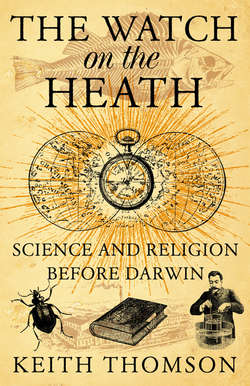Читать книгу The Watch on the Heath: Science and Religion before Darwin - Keith Thomson - Страница 5
PREFACE
ОглавлениеWhen Charles Robert Darwin entered the University of Cambridge in 1828, it was not with the expectation of studying science but rather with every intention of becoming a Church of England priest. He studied theology, philosophy, classics and a little mathematics. We do not know with what enthusiasm he faced the prospect of actually being ordained; his early writings show a conventional set of beliefs and a noticeable lack of religious zeal. Over the following decades, however, everything changed for Darwin. He found that his science, his intellect and his faith had created a set of personal conflicts that he could not resolve.
Charles Darwin’s dilemma was the inevitable consequence of pursuing a system of rational enquiry like science that seeks to explain all apparent mysteries in terms of lawful, natural phenomena. He was forced to choose an intellectual path between a belief that the world was created by God exactly as it is now, and probably some 6,000 years ago, and the growing evidence that the earth and life upon it have evolved slowly, without supernatural assistance, for some 4.5 billion years. In fact, in various guises and under different names, what we call ‘evolution’ had been in the air for at least two hundred years before the publication in 1859 of his On the Origin of Species by Means of Natural Selection and the Preservation of favoured Races in the Struggle for Life. Since about 1650, the development of a whole range of new sciences had posed threat after threat to the mysteries of revealed religion. ‘Evolution’ is part of a much broader and older enquiry and a deeper contest for our intellectual commitment, a contest between a world system that expects every part of the cosmos ultimately to be explainable in terms of natural properties and processes and one that maintains the existence of a fundamental core of unknowability, of supernatural mystery and the controlling hand of an eternal non-worldly Being. This may be humankind’s oldest intellectual puzzle, and this book will attempt to trace one small part of it.
It has not always been necessary to choose between one side or the other: science or religion, reason or mystery. In the age before Darwin, many powerful clerics were also notable scientific scholars and leading scientists were often at least conventionally pious. For them, science and religion could share a common philosophical basis with the premise that a careful, rational study of nature, instead of denying God, would confirm that all life is, after all, the product of God’s unique creation. Natural Theology and its counterpart in the geological context, Physico-Theology, provided an intellectual framework that both embraced science and kept it at bay. Indeed, natural theologians believed that a study of God’s handiwork constituted a proof of the very existence of God. Believers who were scientists welcomed natural theology because it gave their endeavours a framework within which to operate. Deist and Christian alike could find much to favour in a movement that sought to discover God through rational study without depending on a belief in miracles or insisting on the literal truth of the Bible. Some theologians naturally worried that this new movement would risk flirting too seductively with material explanations of the world and preferred to remain with the relative safety of the authority of the Bible and revelation. Nonetheless, in one form or another, natural theology has maintained a currency to the present day. Its last and greatest expression was in the classic work of 1802 by Reverend William Paley, usually known by the short version of its title, Natural Theology. Paley’s arguments have never really been improved upon. His book affords a starting point from which to trace a story that reaches from the ancient Greeks to Descartes and to the intellectual environment of the seventeenth and eighteenth century from which Darwin sprang.
Paley and his predecessors set themselves a daunting task. As the explanatory power of science had reached further and further into the previously secret places of nature and as it progressed beyond simple description of phenomena to explain the earth and life on it in terms of underlying processes, their arguments had to change in response. Some of what they wrote – what they theorised, even what they thought was fact – might almost seem absurd to us now, but the work of people such as the Reverend Thomas Burnet, the Reverend John Ray, Dr Robert Plot, Dr William Whiston, Dr John Woodward, Dr James Hutton, Dr Erasmus Darwin and countless more, writing between 1665 and 1800, gives us an extraordinary glimpse into minds at the forefront of an epic enquiry. Many were deeply religious; all were consumed by the need to solve this potentially all-consuming challenge to their world view. They were often under immense pressure to conform with orthodoxy, even when their intellects pointed them in other directions. As well as admiring the force and elegance of the writing and the inventiveness of the arguments, we may also variously envy these earlier scholars their certitude, their daring, and often their humility and caution. It also becomes clear that this is not just a struggle between two sides; it is also a series of debates raging within both what we now call ‘science’ and ‘religion’.
One of the many ironies about the conflict over the subject of evolution is that as a student Charles Darwin read and admired Paley, including his great work on natural theology. The final theme to this book is to trace out the powerful, direct connection from Paley’s belief that natural theology proved the impossibility of ‘evolution’ to Darwin’s championing of a critically important mechanism for the origin of new species.
